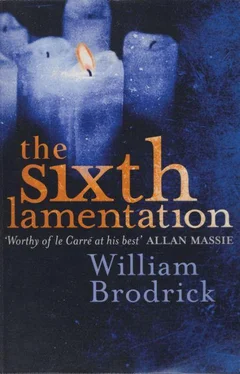William Brodrick - The Sixth Lamentation
Здесь есть возможность читать онлайн «William Brodrick - The Sixth Lamentation» весь текст электронной книги совершенно бесплатно (целиком полную версию без сокращений). В некоторых случаях можно слушать аудио, скачать через торрент в формате fb2 и присутствует краткое содержание. Жанр: Триллер, на английском языке. Описание произведения, (предисловие) а так же отзывы посетителей доступны на портале библиотеки ЛибКат.
- Название:The Sixth Lamentation
- Автор:
- Жанр:
- Год:неизвестен
- ISBN:нет данных
- Рейтинг книги:5 / 5. Голосов: 1
-
Избранное:Добавить в избранное
- Отзывы:
-
Ваша оценка:
- 100
- 1
- 2
- 3
- 4
- 5
The Sixth Lamentation: краткое содержание, описание и аннотация
Предлагаем к чтению аннотацию, описание, краткое содержание или предисловие (зависит от того, что написал сам автор книги «The Sixth Lamentation»). Если вы не нашли необходимую информацию о книге — напишите в комментариях, мы постараемся отыскать её.
The Sixth Lamentation — читать онлайн бесплатно полную книгу (весь текст) целиком
Ниже представлен текст книги, разбитый по страницам. Система сохранения места последней прочитанной страницы, позволяет с удобством читать онлайн бесплатно книгу «The Sixth Lamentation», без необходимости каждый раз заново искать на чём Вы остановились. Поставьте закладку, и сможете в любой момент перейти на страницу, на которой закончили чтение.
Интервал:
Закладка:
22nd May
I have often wondered whether I should tell you about your past, never mind my own. But now the two are inextricably linked. I cannot give you partial truths. So, read these words slowly and understand that I hope not to hurt you. I’m telling you part of your own history and, however painful it might be, it is yours and no one else’s.
I met a woman who had only just arrived in the camp. I could not understand her language, so I know nothing about her. Not even her name. I think she was Polish. She had two children and was gravely ill. Ravensbruck was a women’s camp so I can only assume her husband, your grandfather, had been taken from his family at some time in the past.
You don’t need words to express certain things, or to understand them. So I think, in what mattered, we made contact with one another. She knew she was dying. She knew her children would be left all alone. She knew I was the last person she’d ever speak to. Pleading sounds the same in any language, and she asked me to do something, over and over. I held both her hands, muttering helpless assurances in French. I knew she was begging me to look after her twins, Freddie and Elodie. And I knew she was comforted by my replies. She died while we were talking. Her hands lost their grip, as if she’d let go of a rope, and she fell back. I did not have a name for her, until you were born. I called her Lucy, after you. And you have grown to have her delicate, haunting features.
The rest you know I returned to Paris with fifty or so other camp survivors. We were all terribly thin and a waxy grey-green colour, with brown rings under our eyes. As we lined up on the platform at Gare de l’Est, everyone stopped and stared in silence. They began ‘La Marseillaise’. It was the most moving moment of my life. The last time I’d heard it was at Auschwitz.
While I was in hospital I met Grandpa Arthur, who was recovering from a broken foot. I found him talking to Freddie and Elodie. He introduced himself Over the next few weeks I told him everything. From then on I didn’t need to say any more. He understood. After that I knew I never wanted to leave him. I long to see him again.
When I was discharged I went to what was left of my home. Nothing remained of Madame Klein’s life, or mine, or anyone I had known. I made enquiries and pieced together what I could. Victor betrayed us all. Each and every member of The Round Table had been arrested on the same day as me, mostly that afternoon, in one swoop. Jacques’ family had managed to escape but he’d stayed behind. He must have waited for me in vain, for I did not come. He was arrested that night, in his own home.
I tried to keep my promise, to look after the children, but I failed. And I have never been able to forget the little boy who cried because I’d left him with strangers at the social club. Arthur helped me find out what had happened. My boy had been taken to an orphanage. All of the children were deported to Auschwitz in July 1942. The Red
Cross told me the obvious: no one with his name had survived. At least I spent some time in the place where he met his end. That has been a comfort.
Well, that is what happened, and that is why I am who I am. Do you remember reading out loud with Grandpa Arthur on Sunday afternoons, doing silly voices with serious plays? Do you recall King Lear, when he finally understands that his failures have cost him the lives of his children? He says, ‘I am a man more sinned against than sinning.’ Can you bring yourself to think that of me?
Part Two
‘All burns! The reddest rose is a ghost;
Sparks whirl up, to expire in the mist…’
(Laurence Binyon, ‘The Burning of the Leaves’, 1942)Second Prologue
‘I shall be your amanuensis,’ said Wilma with theatrical gravity. Agnes nodded. It would be the only way now that she could not write. ‘There isn’t much to say but I’d like it set down.’ Ever since she had completed her notebook, Agnes had pored over that dreadful time, rehearsing the order in which things had happened. The act of committing herself to a narrative had lit the past with a new light. She saw new shapes and the hint of an outline she partly recognised.
Agnes opened the drawer of her bureau and took out the remaining school notebook she’d bought six months earlier. She gave it to Wilma, who settled herself down at the table.
‘Start when you are ready,’ said Wilma ceremoniously pen poised.
Agnes closed her eyes, feeling her way And then she began:
“‘Night and day I have lived among the tombs”, comma, “cutting myself on stones”. Full stop. ‘
Wilma wrote slowly, in great swirls. ‘I like that story.’
‘What story?’ asked Agnes sharply wondering if this was a sign of things to come.
‘The one about the poor chap in the hills. He was possessed by so many demons that no one could control him. He lived night and day just as you said, among the tombs. Like we do.’
‘Why do you like it?’ enquired Agnes with feeling.
Wilma put down her pen. ‘Because help eventually came, after everyone had given up and when he was unable to ask for it.’
Agnes’ memory flickered. ‘What happened?’
‘The Saviour sent the lot of them into a herd of pigs grazing on the fat of the land.’
‘That’s right,’ remembered Agnes. ‘The demons were called “Legion” because there were so many of them: Father Rochet had likened them to the German army in France, just as the Roman legions had occupied Palestine.
‘They charged over a cliff into a lake and drowned,’ said Wilma with great satisfaction. ‘And the poor young man was returned to his family’
Oh yes, that’s it, thought Agnes. Father Rochet had said there were plenty of pigs, but no cliff, and as yet, no Messiah. ‘So we have to act while we wait,’ he’d said.
‘Did I say who this was addressed to?’ breathed Agnes, weakened by a new, unexpected certainty.
‘No.’
‘Go back to the beginning them, please.’ She closed her eyes, trying to conjure up an old friend.
‘Dear-’
Chapter Fourteen
Alone at last in the first-floor sitting room overlooking the sea, the old man opened once more the letter from his wife, penned just before she died while he slept in a chair by her bed. She’d told him to read it every time the guilt threatened to overpower him.
My Dearest Victor
I’ve often watched you while you sleep. The bad times have even marked your peace. They’ve never really left you and I doubt if they ever will. But you must believe me: you acted for the best in the most difficult of times. 1 was right when I said all those years ago that sometimes there have to be secrets. What a relief it would be if a great wind would blow and sweep it all away! But that is not going to happen. For twenty-six years we’ve had each other and you could turn to me, and now, well, that is coming to an end. So this is what I have to say. Just look at Robert! Look at all his children! Look at them all! This is your testament. They only see the good man I married, even if the world comes to judge you one day out of hand. I know, and I bless the day I met you.
Your ever-loving
Squirrel
Pauline the squirrel: because she never threw anything out. He folded the paper and put it back in his pocket diary. The words had no effect. They never had done. It wasn’t that Victor didn’t see the wonder of his family He did. But each shining face was only a flickering candle against the endless shadow of slaughter he had known.
After his wife died Victor went on a binge. Not a single monumental blow-out but rather a gradual build-up of solitary chaotic sessions, a ritual that gathered pace and eventually left him flat on the floor almost every day He learned what only the gravely fallen know: there’s a sincerity to drinking, a bravery. It’s not an escape — that’s at the amateur level, carried out with newfound comrades, takeaways and taxis. It’s the opposite. It’s standing your ground, utterly alone, as the demons rise to dance and sneer.
Читать дальшеИнтервал:
Закладка:
Похожие книги на «The Sixth Lamentation»
Представляем Вашему вниманию похожие книги на «The Sixth Lamentation» списком для выбора. Мы отобрали схожую по названию и смыслу литературу в надежде предоставить читателям больше вариантов отыскать новые, интересные, ещё непрочитанные произведения.
Обсуждение, отзывы о книге «The Sixth Lamentation» и просто собственные мнения читателей. Оставьте ваши комментарии, напишите, что Вы думаете о произведении, его смысле или главных героях. Укажите что конкретно понравилось, а что нет, и почему Вы так считаете.












